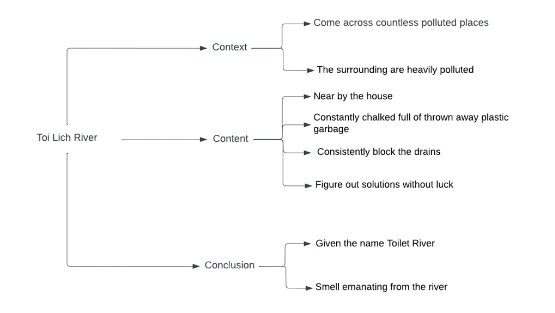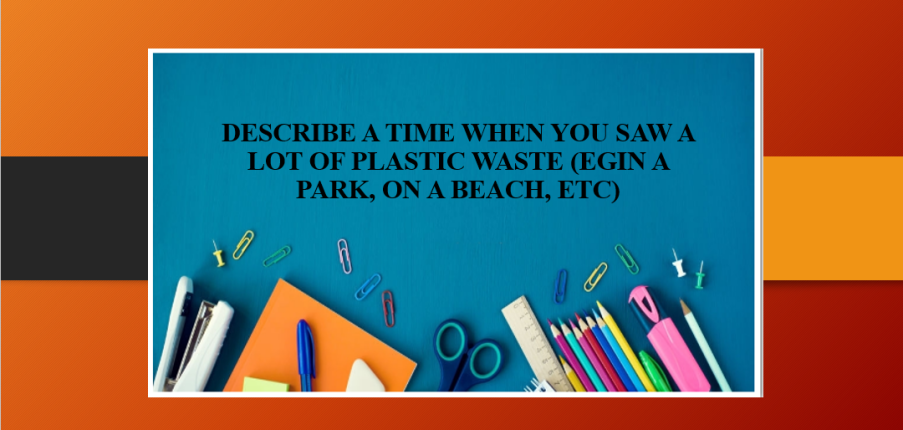Describe a time when you saw a lot of plastic waste (egin a park, on a beach, etc) | Bài mẫu + Từ vựng IELTS Speaking Part 2 + 3
Bài mẫu IELTS Speaking Part 2: Describe a time when you saw a lot of plastic waste (E.g in a park, on the beach etc.)
Đề bài
You should say:
- Where are when you saw the plastic waste
- Why there were a lot of plastic waste
- What you did when you saw them
And explain what you think about this.
Bài mẫu
Bài mẫu 1
If there were a competition for the most distressing moment I’ve ever had, the time when I visited Koh Rong Sanloem would be a strong contender.
If memory serves me correctly, it was in my junior year when my best friend and I decided to travel to that island in Southern Cambodia. Precisely, it is a reputable destination where thousands of tourists flock to every year.
In terms of its attractions, the island was once a fishing village which is currently marketed with untouched natural features. Its simplicity and originality completely stand out. Hence, the authenticity of Cambodian cuisine is well-complemented by the area’s diversity of seafood. What is more, countless aquatic and hiking activities are also its strong hold.
However, it was such a pity that the scenery here was incredibly spoiled with trash, especially plastic bags and bottles. The corporates could perhaps be the villagers and tourists whose negligence and irresponsibility were at the expense of not only the island’s aesthetic but also the marine life. We did try to pick up and categorize the litter on our way, but it was like a drop in the ocean. I wished the local government and environmental enthusiasts would do something about this.
To cut the long story short, it is definitely an unforgettable experience showing how much we have wronged Nature.
Từ vựng
- Reputable (a): có uy tín
- Flock to (verb phrase): đổ về
- Cuisine (n): ẩm thực
- Complemented (a): tôn lên
- Corporates (n): các thủ phạm
- Negligence and irresponsibility (n): sự cẩu thả và thiếu trách nhiệm
- A drop in the ocean: quá nhỏ không đủ sức ảnh hưởng
- Aesthetic (n): thẩm mỹ
- Wrong (v): làm sai/ đối xử tệ
Bài mẫu 2
Dàn ý
|
Context (Bối cảnh)
|
Đã đi qua nhiều nơi ô nhiễm
Vùng xung quanh bị ô nhiễm trầm trọng
|
|
Content (Nội dung)
|
Con sông gần nhà
Chứa đầy rác thải nhựa
Thường xuyên chặn đường ống dẫn nước
Rất khó khăn để tìm ra giải pháp
|
|
Conclusion (Kết thúc)
|
Được đặt tên Toilet River
Mùi hôi tỏa ra từ con sông
|

Bài mẫu
|
Context
|
Unfortunately, I have come across places with excessive plastic pollution more times than I can count. My city and the countryside immediately surrounding it are heavily polluted from recent development and increased urban populations.
|
|
Content
|
In particular, there is a small river near by my house which is constantly chalked full of thrown away plastic bags and bottles that line the edges of the river and consistently block the drains from dealing with flood waters. Over the years I have wracked my brain to figure out a solution to this problem, and I have read sources online about many other much more qualified scientists and engineers trying to do the same, so far also without luck.
|
|
Conclusion
|
The river I mentioned is named Toi Lich River, not-so-lovingly given the name Toilet River due to the smell emanating from it due to the pollution.
|
Từ vựng
- come across / ˈkʌm əˈkrɒs /: tình cờ đi ngang qua
He came across some of his old love letters on his wife's desk.
- Drain (n) /dreɪn/: đường ống dẫn nước
She accidentally dropped her ring down a drain in the road.
- figure out / ˈfɪɡə ˈaʊt /: nghiên cứu, tìm ra
Can you figure out the answer to question 5?
- Emanate (v) /ˈem.ə.neɪt/: tỏa ra
Her face emanated sadness.
Bài mẫu IELTS Speaking Part 3: Plastic products
1. What are the benefits of using plastic products?
Well, I guess there are a few merits when we make the most of plastic.
First of all, its lightweight and durability are ideal criteria for containers and other products. You know, it is unlikely to rust and spoil the content.
Additionally, plastic is recyclable at a lower cost, compared to metal and glass.
Lastly, this material helps promote consumerism when merchandise is economically manufactured and thus affordable for customers.
- Lightweight and durability (n): nhẹ và bền
- Rust (v): rỉ sét
- Consumerism (n): chủ nghĩa tiêu dùng, mua nhiều đồ và có những hậu quả lên môi trường hoặc hành vi tiêu dùng…
→ Bài giải liệt kê hai lợi ích của đồ nhựa.
- Nhẹ và bền, không dễ hư
- Giá rẻ/ dễ tái chế
Thí sinh có thể liệt kê những ý khác nhưng lưu ý discourse markers chuyển giữa các ý.
2. How can people reduce their use of plastic?
Honestly, there are several ways for people to cut down on the daily amount of plastic.
To begin with, they could replace plastic containers with other ones. For example, they can bring their own bottles for beverages and tote bags when shopping.
Secondly, they can reuse their plastic products for other purposes, such as growing plants or making crafts.
- Cut down on (verb phrase): cắt giảm
- Beverages (n): đồ uống
- Tote bags (n): túi vải xách đồ
→ Bài giải liệt kê 2 cách thức giảm lượng rác nhựa. Thí sinh có thể chọn liệt kê thêm, đi kèm với việc giải thích lý do/ lợi ích/ dùng ví dụ để phát triển ý.
3. What kind of plastic waste is often seen in Vietnam?
Well based on my experience, there are some common types of plastic waste in my country. But I assume that the most ubiquitous would be containers for beverages and food or bags. This is because they are consumed and thrown away on a daily basis.
As well as those mentioned products, another kind worth mentioning would be household appliances. Nowadays, industrial technology facilitates better manufacturing processes so that those appliances can be sold at a price to suit everyone’s pocket. As a result, the products’ lifespan is much shorter, and they end up in landfills.
- Ubiquitous (a): phổ cập/ có mặt khắp nơi
- Lifespan (n): tuổi thọ/ vòng đời của sản phẩm
- Landfills (n): bãi rác
→ Câu hỏi yêu cầu nêu các loại rác thải nhựa thường gặp.
- các hộp, chai, ly và túi gọi chung là đồ đựng/ đồ chứa
- sản phẩm vật dụng trong gia đình (có thể liệt kê ra)
Ngoài ra thí sinh có thể chọn liệt kê những loại khác nhưng nên nêu lý do tại sao người ta lại thải ra nhiều hơn những loại khác.
4. What are the problems when there is too much plastic waste?
As a matter of fact, there are two evident consequences when the amount of plastic pollution is too much to handle. First of all, it renders the natural world vulnerable since it has fatal effects on animals both on land and in the ocean. Many marine creatures were choked on plastic bags, which has received heavy coverage on the news in recent years.
Secondly, the environment we live in will be impacted as well. The health problems related to hazardous release from waste incineration and micro-plastic contamination have gained much contention.
- Consequences (n): hậu quả
- Fatal (a): gây tử vong
- Choked (a): bị nghẹn/mắc cổ
- Received heavy coverage on the news (phrase): được nhiều trang báo đưa tin
- Hazardous (a): nguy hiểm
- Release (v, n): phóng thích/ (chất) thải ra
- Waste incineration (noun phrase): đốt chất thải
- Micro-plastic (n): vi nhựa
- Contamination (n): sự ô nhiễm
- Contention (n): sự tranh cãi
Xem thêm các tài liệu Tiếng Anh hay, chi tiết khác:
TOP Việc làm "HOT" dành cho sinh viên:





